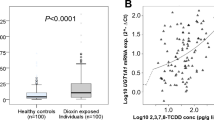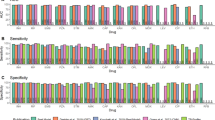Abstract
Human UDP-glucuronosyltransferase (UGT) is a part of a major excretion pathway for endobiotics and xenobiotics. The UGT family of genes is highly polymorphic, and our aim is to describe novel polymorphisms at the UGT1A3 locus and determine how they alter substrate metabolism and drug reactions. One hundred healthy Japanese adults volunteered for the present study. We sequenced PCR-amplified fragments of the gene directly, and calculated the frequency of the genetic variations detected. To measure variant enzyme activity, we constructed five expression models and used estrone as the substrate in the assays. We identified six novel single nucleotide polymorphisms (SNPs). Of these, four caused amino acid substitutions (17A→G: Q6R, 31T→C: W11R, 133C→T: R45W, and 140T→C: V47A) and the remaining two were silent (81G→A: E27E and 447A→G: A159A). We found five types of alleles having differing SNP combinations: wild type (frequency=0.61), W11R-E27E-A159A (0.10), Q6A-W11R-E27E-A159A (0.055), W11R-E27E-V47A-A159A (0.125), and R45W (0.11). Expression studies found that the variants changed the enzyme efficiencies (K m/V max) to 121% of the wild type for W11R, 86% for Q6R-W11R, 369% for W11R-V47A, and 70% for R45W. Several UGT 1A3 polymorphisms exist in the Japanese population, having different levels of activity. These polymorphisms are capable of affecting the steady state levels of estrogens, and may increase sensitivity to adverse drug effects.
Similar content being viewed by others
Log in or create a free account to read this content
Gain free access to this article, as well as selected content from this journal and more on nature.com
or
References
Adachi Y, Kamisako T, Koiwai O, Yamamoto K, Sato H (1996) Genetic background of constitutional unconjugated hyperbilirubinemia. Int Hepatol Commun 5:297–307
Adlercreutz H, Gorbach SL, Goldin BR, Woods MN, Dwyer JT, Hamalainen E (1994) Estrogen metabolism and excretion in Oriental and Caucasian women. J Natl Cancer Inst 86:1076–1082
Akaba K, Kimura T, Sasaki A, Tanabe S, Ikegami T, Hashimoto M, Umeda H, Yoshida H, Umetsu K, Chiba H, Yuasa I, Hayasaka K (1998) Neonatal hyperbilirubinemia and mutation of the bilirubin uridine diphosphate-glucuronosyltransferase gene: a common missense mutation among Japanese, Koreans and Chinese. Biochem Mol Biol Int 46:21–26
Albert C, Vallee M, Beaudry G, Belanger A, Hum DW (1999) The monkey and human uridine diphosphate-glucuronosyltransferase UGT1A9, expressed in steroid target tissues, are estrogen-conjugating enzymes. Endocrinology 140:3292–3302
Ando Y, Saka H, Ando M, Sawa T, Muro K, Ueoka H, Yokoyama A, Saitoh S, Shimokata K, Hasegawa Y (2000) Polymorphisms of UDP-glucuronosyltransferase gene and irinotecan toxicity: a pharmacogenetic analysis. Cancer Res 60:6921–6926
Bansal SK, Gessner T (1980) A unified method for the assay of uridine diphosphoglucuronyltransferase activities toward various aglycones using uridine diphospho[U–14C]glucuronic acid. Anal Biochem 109:321–329
Belanger A, Hum DW, Beaulieu M, Levesque E, Guillemette C, Tchernof A, Belanger G, Turgeon D, Dubois S (1998) Characterization and regulation of UDP-glucuronosyltransferases in steroid target tissues. J Steroid Biochem Mol Biol 65:301–310
Bernstein L, Ross RK (1993) Endogenous hormones and breast cancer risk. Epidemiol Rev 15:48–65
Bhasker CR, McKinnon W, Stone A, Lo AC, Kubota T, Ishizaki T, et al (2000) Genetic polymorphism of UDP-glucuronosyltransferase 2B7 (UGT2B7) at amino acid 268: ethnic diversity of alleles and potential clinical significance. Pharmacogenetics 10:679–851
Bosma PJ, Chowdhury JR, Bakker C, Gantla S, Boer A, Oostra BA, Lindhout D, Tytgat GN, Jansen PL, Elferink RP, Chowdhury NR (1995) The genetic basis of the reduced expression of bilirubin UDP-glucuronosyltransferase 1 in Gilbert’s syndrome. N Engl J Med 333:1171–1175
Cheng Z, Rios GR, King CD, Coffman BL, Green MD, Mojarrabi B, Mackenzie PI (1998) Glucuronidation of catechol estrogens by expressed human UDP-glucuronosyltransferases (UGTs) 1A1, 1A3, and 2B7. Toxicol Sci 45:52–57
Ciotti M, Marrone A, Potter C, Owens IS (1997) Genetic polymorphism in the human UGT1A6 (planar phenol) UDP-glucuronosyltransferase: pharmacological implications. Pharmacogenetics 7:485–495
Dutton GJ (1980) Glucuronidation of drugs and other compounds. CRC, Boca Raton
English MA, Kane KF, Cruickshank N, Langman ML, Stewart PM, Hewison M (1999) Loss of estrogen inactivation in colonic cancer. J Clin Endocrinol Metab 84:2080–2085
Green MD, King CD, Mojarrabi B, Mackenzie PI, Tephly TR (1998) Glucuronidation of amines and other xenobiotics catalyzed by expressed human UDP-glucuronosyltransferase 1A3. Drug Metab Dispos 26:507–512
Guillemette C, Ritter JK, Auyeung DJ, Kessler FK, Housman DE (2000a) Structural heterogeneity at the UDP-glucuronosyltransferase 1 locus: functional consequences of three novel missense mutations in the human UGT1A7 gene. Pharmacogenetics 10:629–644
Guillemette C, Millikan RC, Newman B, Housman DE (2000b) Genetic polymorphisms in uridine diphospho-glucuronosyltransferase 1A1 and association with breast cancer among African Americans. Cancer Res 60:950–956
Haque SJ, Peterson DD, Nebert DW, Mackenzie PI (1991) Isolation, sequence, and developmental expression of rat UGT2B2: the gene encoding a constitutive UDP-glucuronosyltransferase that metabolizes etiocholanolone and androsterone. DNA Cell Biol 10:515–524
Henderson BE, Ross RK, Pike MC, Casagrande JT (1982) Endogenous hormones as a major factor in human cancer. Cancer Res 42:3232–3239
Huang Y-H, Galijatovic A, Nguyen N, Geske D, Beaton D, Green J, Green M, Peters WH, Tukey RH (2002) Identification and functional characterization of UDP-glucuronosyltransferases UGT1A8*1, UGT1A8*2 and UGT1A8*3. Pharmacogenetics 12:287–297
Hum DW, Belanger A, Levesque E, Barbier O, Beaulieu M, Albert C, Vallee M, Guillemette C, Tchernof A, Turgeon D, Dubois C (1999) Characterization of UDP-glucuronosyltransferases active on steroid hormones. J Steroid Biochem Mol Biol 69:413–423
Ito M, Yamamoto K, Sato H, Fujiyama Y, Bamba T (2001) Inhibitory effect of troglitazone on glucuronidation catalyzed by human uridine diphosphate-glucuronosyltransferase 1A6. Eur J Clin Pharmacol 56:893–895
Iyanagi T, Haniu M, Sogawa K, Fujii-Kuriyama Y, Watanabe S, Shively JE, Anan KF (1986) Cloning and characterization of cDNA encoding 3-methylcholanthrene inducible rat mRNA for UDP-glucuronosyltransferase. J Biol Chem 261:15607–15614
Lampe JW, Bigler J, Horner NK, Potter JD (1999) UDP-glucuronosyltransferase (UGT1A1*28 and UGT1A6*2) polymorphisms in Caucasians and Asians: relationships to serum bilirubin concentrations. Pharmacogenetics 9:341–349
Lavesque E, Beaulieu M, Hum DW, Belanger A (1999) Characterization and substrate specificity of UGT2B4 (E458): a UDP-glucuronosyltransferase encoded by a polymorphic gene. Pharmacogenetics 9:207–216
Mackenzie PI, Rodbourn L (1990) Organization of the rat UDP-glucuronosyltransferase, UDPGTr-2, gene and characterization of its promoter. J Biol Chem 265:11328–11332
Mackenzie PI, Owens IS, Burchell B, Bock KW, Bairoch A, Belanger A, Fournel-Gigleux S, Green M, Hum DW, Iyanagi T, Lancet D, Louisot P, Magdalou J, Chowdhury JR, Ritter JK, Schachter H, Tephly TR, Tipton KF, Nebert DW (1997) The UDP glycosyltransferase gene superfamily: recommended nomenclature update based on evolutionary divergence. Pharmacogenetics 7:255–269
Macleod SL, Nowell S, Plaxco J, Lang NP (2000) An allele-specific polymerase chain reaction method for the determination of the D85Y polymorphism in the human UDP-glucuronosyltransferase 2B15 gene in a case-control study of prostate cancer. Ann Surg Oncol 72:777–782
Maruo Y, Nishizawa K, Sato H, Doida Y, Shimada M (1999) Association of neonatal hyperbilirubinemia with bilirubin UDP-glucuronosyltransferase polymorphism. Pediatrics 103:1224–1227
Maruo Y, Nishizawa K, Sato H, Sawa H, Shimada M (2000) Prolonged unconjugated hyperbilirubinemia associated with breast milk and mutations of the bilirubin uridine diphosphate-glucuronosyltransferase gene. Pediatrics 106:E59
McGonigle KF, Karlan BY, Barbuto DA, Leuchter RS, Lagasse LD, Judd HL (1994) Development of endometrial cancer in women on estrogen and progestin hormone replacement therapy. Gynecol Oncol 55:126–132
Mojarrabi B, Butler R, Mackenzie PI (1996) cDNA cloning and characterization of the human UDP glucuronosyltransferase, UGT1A3. Biochem Biophys Res Commun 225:785–790
Monaghan G, Ryan M, Seddon R, Hume R, Burchell B (1996) Genetic variation in bilirubin UDP-glucuronosyltransferase gene promoter and Gilbert’s syndrome. Lancet 347:578–581
Ohta H, Ikeda T, Masuzawa T, Makita K, Suda Y, Nozawa S (1993) Differences in axial bone mineral density, serum levels of sex steroids, and bone metabolism between postmenopausal and age-and body size-matched premenopausal subjects. Bone 14:111–116
Ritter JK, Sheen YY, Owens IS (1990) Cloning and expression of human liver UDP-glucuronosyltransferase in COS-1 cells. 3,4-Catechol estrogens and estriol as primary substrates. J Biol Chem 265:7900–7906
Ritter JK, Chen F, Sheen YY, Tran HM, Kimura S, Yeatman MT, Owens IS (1992a) A novel complex locus UGT1 encodes human bilirubin, phenol, and other UDP-glucuronosyltransferase isozymes with Identical carboxyl termini. J Biol Chem 267:3257–3261
Ritter JK, Chen F, Sheen YY, Lubet RA, Owens IS (1992b) Two human liver cDNAs encode UDP-glucuronosyltransferases with 2 log differences in activity toward parallel substrates including hydroxycholic acid and certain estrogen derivatives. Biochemistry 31:3409–3414
Sato H, Adachi Y, Koiwai O (1996) The genetic basis of Gilbert’s syndrome. Lancet 347:557–558
Seppen J, Steenken E, Lindhont D, Bosma PJ, Elferink RP (1996) A mutation which disrupts the hydrophobic core of the signal peptide of bilirubin UDP-glucuronosyltransferase, an endoplasmic reticulum membrane protein, causes Crigler–Najjar type II. FEBS Lett 390:294–298
Strassburg CP, Oldhafer K, Manns MP, Tukey RH (1997) Differential expression of the UGT1A locus in human liver, biliary, and gastric tissue: identification of UGT1A7 and UGT1A10 transcripts in extrahepatic tissue. Mol Pharmacol 52:212–220
Toniolo PG, Levitz M, Zeleniuch-Jacquotte A, Banerjee S, Koenig KL, Shore RE, Strax P, Pasternack BS (1995) A prospective study of endogenous estrogens and breast cancer in postmenopausal women. J Natl Cancer Inst 87:190–197
Ueyama H, Koiwai O, Soeda Y, Sato H, Satoh Y, Ohkubo I, Doida Y (1997) Analysis of the promoter of human bilirubin UDP-glucuronosyltransferase gene (UGT1A*1) in relevance to Gilbert’s syndrome. Hepatol Res 9:152–163
Vogel A, Kneip S, Barut A, Ehmer U, Tukey RH, Manns MP, Strassburg CP (2001) Genetic link of hepatocellular carcinoma with polymorphisms of the UDP-glucuronosyltransferaseUGT1A7 gene. Gastroenterology 121:1136–1144
Yamamoto K, Sato H, Fujiyama Y, Doida Y, Bamba T (1998) Contribution of two missense mutations (G71R and Y486D) of the bilirubin UDP glycosyltransferase (UGT1A1) gene to phenotypes of Gilbert’s syndrome and Crigler–Najjar syndrome type II. Biochim Biophys Acta 1406:267–273
Zheng Z, Park JY, Guillemette C, Schantz SP, Lazarus P (2001) Tobacco carcinogen-detoxifying enzyme UGT1A7 and its association with orolaryngeal cancer risk. J Natl Cancer Inst 93:1411–1418
Acknowledgements
We thank Prof. K. Horiike of the Department of Biochemistry I, Shiga University of Medical Science, for helpful suggestions and for comments on the kinetic analysis of UGT1A3. We also thank Mr M. Suzaki of the Central Research Laboratory, Shiga University of Medical Science, for technical assistance. This work was partly supported by grants-in-aid for scientific research from the Ministry of Education, Science, and Culture of Japan (14704032 and 12204061) and the Morinaga Hoshi-kai (Tokyo, Japan).
Author information
Authors and Affiliations
Corresponding author
Additional information
The accession numbers of new nucleotides: AB120359, AB120360, AB120361, AB120362.
Rights and permissions
About this article
Cite this article
Iwai, M., Maruo, Y., Ito, M. et al. Six novel UDP-glucuronosyltransferase (UGT1A3) polymorphisms with varying activity. J Hum Genet 49, 123–128 (2004). https://doi.org/10.1007/s10038-003-0119-y
Received:
Accepted:
Published:
Issue date:
DOI: https://doi.org/10.1007/s10038-003-0119-y
Keywords
This article is cited by
-
Identification of low-frequency variants of UGT1A3 associated with bladder cancer risk by next-generation sequencing
Oncogene (2021)
-
Profiling Serum Bile Acid Glucuronides in Humans: Gender Divergences, Genetic Determinants, and Response to Fenofibrate
Clinical Pharmacology & Therapeutics (2013)
-
Farnesoid X receptor alpha: a molecular link between bile acids and steroid signaling?
Cellular and Molecular Life Sciences (2013)
-
Influence of UDP-glucuronosyltransferase polymorphisms on valproic acid pharmacokinetics in Chinese epilepsy patients
European Journal of Clinical Pharmacology (2012)
-
UDP-Glucuronosyltransferase (UGT) Polymorphisms Affect Atorvastatin Lactonization In Vitro and In Vivo
Clinical Pharmacology & Therapeutics (2010)



